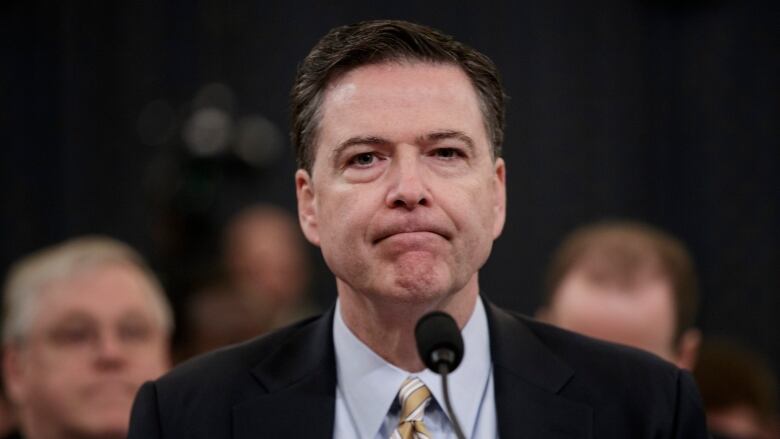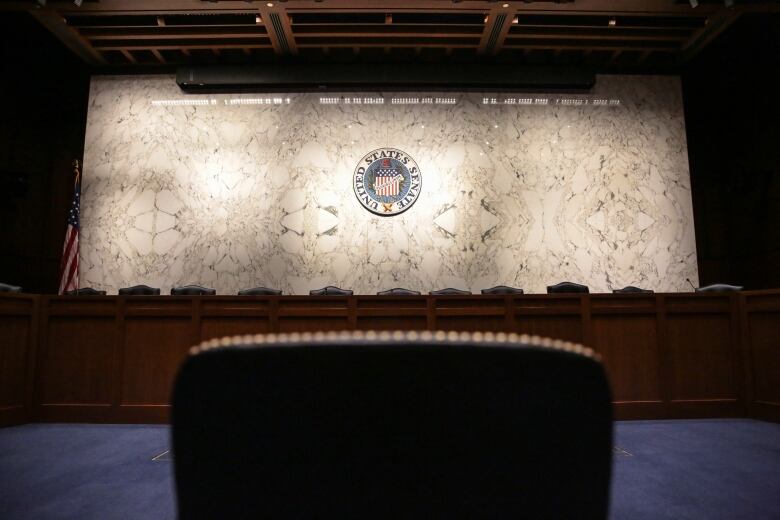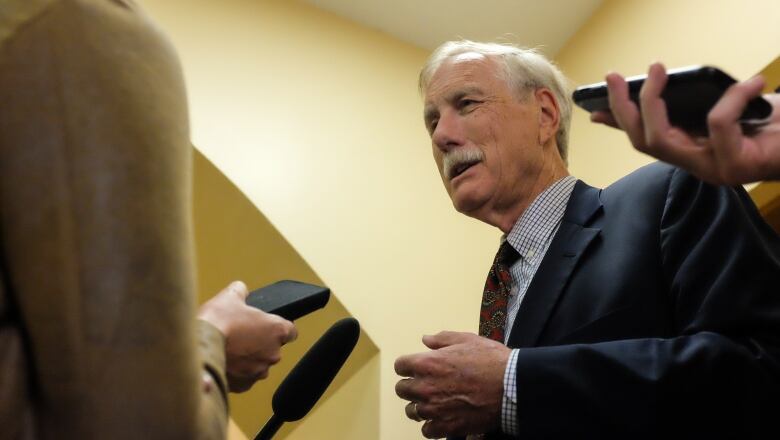Questions for James Comey could make for a bombshell hearing
Ex-FBI director will give 1st public testimony since he was fired by U.S. President Donald Trump

- UPDATE: Early Wednesday afternoon, the Senate intelligence committee released the prepared written statement former FBI director James Comey submitted to the committee ahead of Thursday's hearing. Read the full statement.
On Thursday morning in Washington, scores of journalists and members of the public will attempt to cram into Room 216 of the Hart Senate Office Building to witness what might be the hottest political event in years the testimony of former FBI director James Comey.
So anticipated is his testimonythat CNN has begun a "countdown to Comey" clock. Meanwhile, the main U.S. networks will interrupt their regularly scheduled programsto broadcast what's expectedto be hours of high political drama.
"There'sa lot of questions that have to be answered," said Democratic Massachusetts Senator Ed Markey.
ButComeymay have undercut some of those questions on Wednesdaywhen he released to the Senate intelligence committeea full transcript of his opening statement.
When he testifies Thursday, it will bethe first time hehas givenpublic testimonysince U.S. President Donald Trump fired him on May 9. And what he says could have significant ramifications for the president, with possibly more calls for impeachment or more accusations that he broke the law.
- Comey's testimony is scheduled to begin at 10 a.m. ET on Thursday, and will be shown live on CBC News Network, our live blog at CBCNews.ca, the CBC NewsFacebookpage and on YouTube.
The Senate intelligence committee is just one of a number of committees and agencies, including the FBI, that are investigating whether Russia meddled in the 2016 presidential election, or what'smore politically explosive, whethermembers of the Trump campaign team co-ordinated efforts with officials from Moscow.

"[Comey's testimony] isvery significant," Democratic Senator Tim Kaine, theformer running mate of failed presidential candidate Hillary Clinton, told CBC News.
The Senate intelligence committee and thespecial counselare investigating "very grave matters," Kaine said.
"It's obstruction of justice potentially,it's espionage potentially,it's treason, potentially, conflicts of interest, potentially.These are very seriousmatters, and I think Comey's testimony will probablybe really important in terms of basic facts."
- WATCH | How hard is it to impeach a U.S. president?
- LIVE | Follow Thursday's hearing on our live blog
Republican Senator Ted Cruz, when asked what he hoped to hear at the committee, was much more guarded, simply stating that he, like others, looks forward to Comey's testimony.
"I think investigationsshould be drivenby the facts and not anonymous leaks in newspapers," he told CBC News. "So, hopefully, this hearing makes some positive steps towards developing the facts."

Among those anonymous leaks is the most potentially damaging allegation against Trump, that he may have asked Comey to drop his investigation into the president's former national security adviser Michael Flynn. This, some suggest, could be considered obstruction of justice.
"If he confirms that the president tried to obstruct justice, it will be a bombshell,"Democratic New York Senator Richard Blumenthal told CBC News.
- Trump reportedly shared secrets with the Russians. Will it put lives at risk? Is it impeachable?
- Donald Trump won't use executive privilege to blockComeytestimony, White House says
For his part, Trump has vehemently denied that he was in any wayinvolved in colluding with Russia to meddle in the election. And the White House has denied that Trump made any attempt to thwart Comey'sinvestigation.

Independent Senator Angus King, who is on the intelligence committee,cautioned thatComey's testimony could be tempered by requests from former FBI director Robert Mueller,who was appointed special counselby the U.S. Justice Department to look into the Russia-Trump controversy.
"It may be that directorMuellerwants to limit the testimony to not prejudice the investigation that's going on," Kingsaid.
Still, King said he would be surprised ifComey agreed to testify without having something important to say.
The importance of Comey's testimony will likely be judged on his answers to the followingquestions:
Did Trump ask Comey to drop the investigation into Flynn?
That, according to Republican Senator John McCainof Arizona, is the mostimportant question that Comey needs to answer. The FBI is reportedly investigating ties between Flynn and Russia.

The New York Times reported the existence of a memo, supposedly written by Comey after a meeting he had with Trump in the Oval Office in February.
"I hope you canlet this go," the president told Comey, according to the memo, the Times reported.
Comey, in his statement, confirms the Times story, but addsthat he believed Trump was requesting that the FBIdrop any investigation of Flynnin connection with false statements about his conversations with the Russian ambassador in December.
"I did not understand the president to be talking about the broader investigation into Russia or possible links to his campaign. I could be wrong, but I took him to be focusing on what had just happened with Flynn's departure and the controversy around his account of his phone calls. Regardless, it was very concerning, given the FBI's role as an independent investigative agency.
Such a request, some observers say, would at best be considered highly inappropriateand at worstobstruction of justice, a criminal act.
The White House denied the report, saying the president neverattempted to end any investigation and that the memo was not"a truthful or accurate portrayal of the conversation between the president and Mr. Comey."
Did Trump ask for a 'loyalty pledge'?
The New York Times had reported that shortly after Trump's inauguration, the president had a private dinner with theFBI director. At this dinner, according to the New York Times, Trump reportedly asked Comey if he would pledge his loyalty to him.
Comey confirms this in his written statement and says he told Trump that he would get "honest loyalty."

"It is possible we understood the phrase "honest loyalty" differently, but I decided it wouldn't be productive to push it further. The term honest loyalty had helped end a very awkward conversation and my explanations had made clear what he should expect."
But Trumphas denied he requested that Comey pledge loyalty.
"No, I didn't, but I don't think it would be a bad question to ask," he told Fox News in an interview"I think loyalty to the country, loyalty to the U.S., is important."
Does Comey think he was fired as part of an attempt by the president to thwart his investigation?
While Trump had the authority to fire Comey, the timing of his dismissal sparked outrage by many who accused the president of attempting to quash the FBI investigation into possible Russian collusion with the Trump campaign team.
Trump, in his interview with NBC News anchor Lester Holt, said he fired Comey because he was a "showboat" and a "grandstander" and that the FBI, under his leadership, had been in "turmoil."
Trump also indicated hedismissed Comeybecause the "Russia thing with Trump and Russia is a made-up story."
Did Comeyassure the president three times that he was not under investigation?
In Trump's termination letter toComey, the president stated: "I greatly appreciate you informing me on three separate occasions that I am not under investigation."
In the interview with Holt, Trump saidthat during a dinner with Comey, and in two separate phone calls, Comey hadassured him he was not under investigation. Yet, in an interview withCBC's Matt Kwong,some retired FBI agents expressed skepticismand questionedwhy someone of Comey's standing and professional reputation would engage Trump in a conversation that so clearly presents a conflict of interest.

Republican Senator Susan Collins of Maine, who is also a member of the Senate intelligence committee, said it will be one of the first questions sheasksComey.
"What was the basis for that if that is an accurate statement?Was he surprised to read that in the letter?What was the context?When did it occur?A lot of questions about that."
Why didn'tComeytake his concerns to the Justice Department?
Some have questioned why, ifComeybeen so concerned about the appropriateness of the requests made by the president,he did not report those concerns to his superiors at the Department of Justice.
"The question for West Virginians is, 'If you knew, or you thought that there was obstruction of justice, why didn't you act on it?" DemocraticSenator JoeManchin, a member of the intelligence committee, told CBS News."What were his concerns, and if there were deeper concerns, why wasn't anything done at that time?"
In his statement, Comey says the FBI leadership team agreed that givenit was a one-on-one conversation withTrump, "there was nothing available to corroborate my account."
He says the FBI concluded it didn't make sense to inform Attorney General Jeff Sessions, since he was going recuse himself from the investigation.
"We decided to keep it very closely held, resolving to figure out what to do with it down the road as our investigation progressed."












_(720p).jpg)


 OFFICIAL HD MUSIC VIDEO.jpg)
.jpg)



























































































